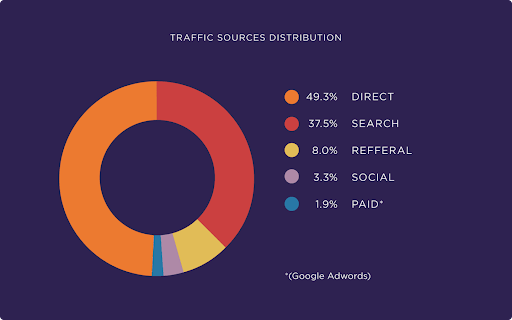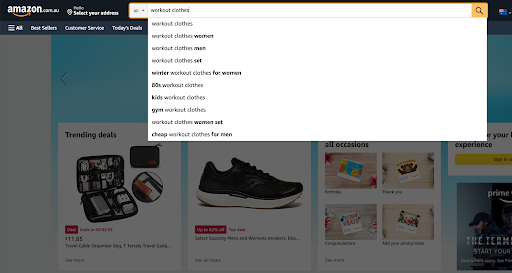With so many businesses going online in the last few years, eCommerce has seen a massive boom in Australia. In fact, Australia is the eleventh largest e-commerce market in the world, and revenue is predicted to hit USD 32.3 billion by 2024.
Now’s a great time to be in eCommerce. But it also means that everyone is jumping on the bandwagon. How can you make sure that your online store gets seen in the mix?
Enter eCommerce SEO.
In this guide, we’ll show you what eCommerce SEO is, why it’s so crucial for your online business, and how you can get started with some eCommerce best practices.
What is eCommerce SEO?
E-commerce SEO is how you make sure that your online store is visible to potential buyers on the results page of a search engine. This means that when someone searches for a particular product or product type, they’ll see your store before anyone else.
Is SEO important for eCommerce?
SEO is vital for any eCommerce business – especially if you’re selling the same products as your competitors. You’ll lose a sale if your products don’t rank on the first page or rank below your competitors on the first page. It’s as simple as that.
In fact, 37.5% of all traffic to eCommerce sites comes from searches. This means that if your site is not optimized, you could be losing out on over a third of the sales you could be bringing in.
Source: Backlinko
Apart from sales, eCommerce SEO can also decrease the amount you have to spend on paid ads, allowing you to lower your cost per customer acquisition.
How to increase your web traffic with eCommerce SEO
Start with keyword research
Like any solid SEO strategy, you need to find keywords that you can rank for – and that get enough volume every month. You can refer to our more comprehensive keyword research guide for more details on how to get started.
Amazon is full of buyer-intent keywords in your niche. All you have to do is type your products and any variations that you can think of in the search bar, and it will give you a range of keywords that people are searching for.
Say I sell workout clothes. These are all the different keywords when I type ‘workout clothes’ into the search bar.
These searches also tend to be long-tail keywords, which are far less competitive and convert far better.
When choosing keywords, you’ll want to evaluate them by:
- How many people are searching for them
- Whether the keywords have a lot of competition to rank
- Whether the keywords related closely to what you sell
- Whether searchers are looking to buy
You can use keyword tools such as:
- Google Keyword Planner
- KeywordTool.io
- Moz Keyword Explorer
- Ahrefs
- Semrush
Optimize your site structure
You want to keep two things in mind: scalability and navigation.
Your site should be simple enough that you can scale it up as you release new products in your online store. This means you won’t have to redesign it too soon.
You also want to ensure that it is easy to navigate for a user. As a general rule, you should never be more than three clicks away from the homepage. If you have any more than this, chances are your structure is a bit too complex and confusing.
Tackle on-page eCommerce SEO
Title tags
Your title gets a buyer to click through and choose your product. It needs to be a good one and well-optimized for search.
Make sure to include your main keyword and that your title is no longer than 60 characters. You may also wish to have words like cheap, best, online, or details like free shipping.
Meta description
While Google can pull a description from your site, writing a unique report for every page is always best. And yes, that includes your product and category pages.
Your description does not affect your SEO – but it does affect whether or not people click. For best results, ensure your description is between 50 and 160 characters and includes your main keyword and a call to action.
Product and category pages
As a general rule, pages should:
- Be longer than 1000 words
- Include your primary keyword 3-5 times
- Include related keywords (semantic keywords) your buyers may search for
Now, you might be thinking that it’ll be impossible to make your pages that long. This is why we suggest prioritizing your top 10-15 pages.
It’s worth noting that although many in the SEO world say duplicate content is harmful to your ranking, Google’s John Mueller confirmed that e-commerce pages could include repeated content like product descriptions or specifications.
However, you’ll want to produce enough unique content to ensure that you answer the buyer’s questions and that the reader is not constantly rereading the same information.
Internal links
Linking to pages with high authority – say, popular blog posts or pages that get a lot of traffic – can pass that authority to new pages. You can find out more about linking here.
That’s a lot of work! What if I don’t have time for it all?
That’s not even half of it! There’s also technical SEO, link building, SEO content writing, and a range of other things you’ll need to do to get your online store seen.
You can take all these steps or hire an experienced eCommerce SEO agency. This will ensure you get the best results and can focus more on growing your eCommerce business.
Hire an e-commerce SEO agency today.
At Search Marketing Group®, we can create a powerful SEO strategy for your eCommerce website and help you get seen.
We’ve helped an online sporting goods store achieve $10 million in annual revenue, a farm equipment supplier achieve a 1200% ROI, and increased a custom rubber stamp store’s organic traffic by 130%.
Book a free consultation with our specialists today to see how we can help with your e-commerce SEO.



























